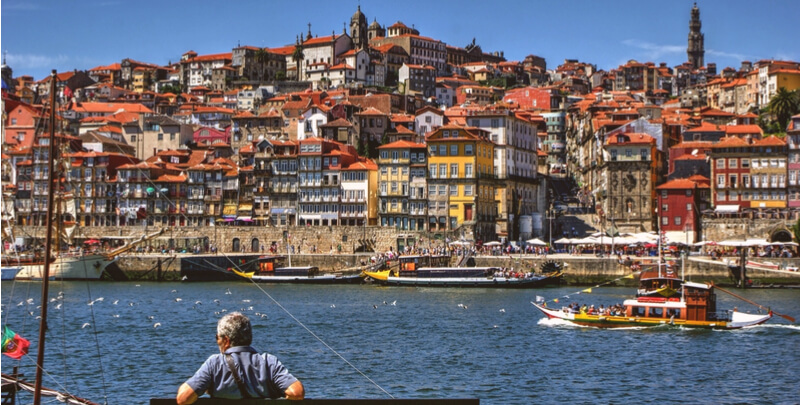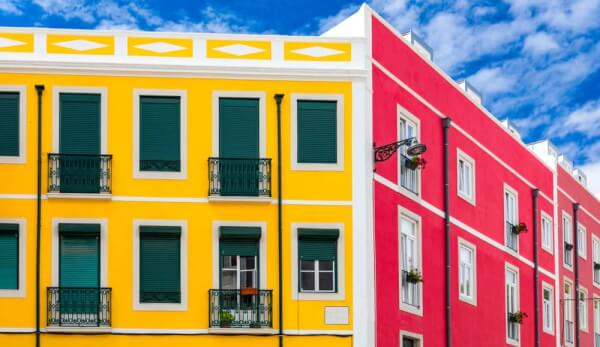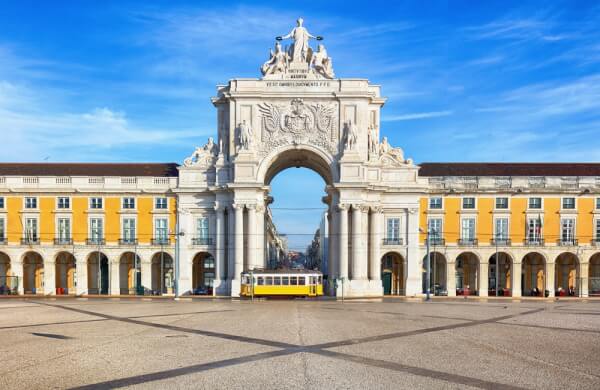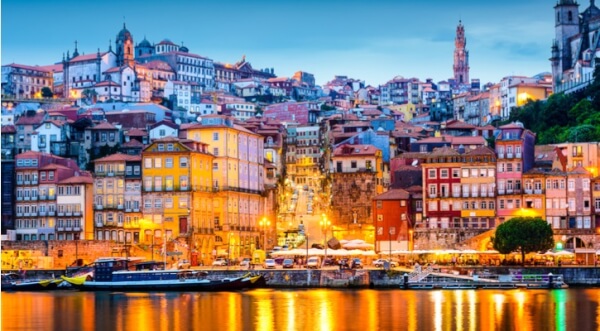Moving to Portugal from the UK: a complete how to guide
Thinking of starting a new life somewhere warm and sunny? Portugal might be just the perfect spot. In fact, UK natives are the second largest expat group in...

Considering a post-career stint in Portugal? In recent years, expatriates have flocked there for short and long-term stays. Retirees can find a welcoming country of friendly people, great weather and a reasonable cost of living. Especially along the south coast in places like the Algarve, seniors have created communities full of similarly-minded expatriates. In Portugal your pension will go much further than at home, whether you’re a Brit, an American or an Australian. Here is what you need to know to get there.
Portugal is part of the eurozone, so when you’re there you’ll use the euro. In the currency exchange market it’s written as EUR. In shops you’ll see prices listed with the symbol €. One more benefit of retiring to Portugal: you can travel between EU countries without exchanging any currency. As of summer 2017, approximate exchange rates for the euro are:
You don’t need a lot of money to enjoy a high standard of living in Portugal. If you or someone you know has a local Portuguese bank account, it’s easy to use Wise to help you access your money abroad. Wise uses the real exchange rate and applies a low fixed fee - leaving you with more money to enjoy your retirement.
If you’re wondering what your budget might look like, here are some expense estimates:
| Item | Approximate cost in Portugal |
|---|---|
| gallon of milk | 2.18 EUR |
| loaf of bread | 0.91 EUR |
| bottle of water | 1.27 EUR |
| three drinks in a bar | 10 EUR |
| pizzeria lunch for two | 15 EUR |
| meal for two at mid-range restaurant | 30 EUR |
| monthly rent, one-bedroom apartment | 482 EUR |
| monthly rent, three-bedroom apartment | 700 EUR |
| one-way ticket on local transport | 1.15 EUR |
| basic utilities | 88.15 EUR |
Even without massive savings fueling you, it’s possible to retire comfortably in Portugal. A €15,000 annual budget should suffice, if you’re willing to live cheaply. Even on a modest salary, €18,000 to €20,000 a year will get you by. For €30,000 a year, you’ll live a fairly luxurious lifestyle. That pool or spare bedroom you couldn’t afford back home? It’s all yours in Portugal.
Housing prices are fairly cheap, but analysts and investors claim the market is seeing an uptick. If you’re looking to buy property in Portugal, it’s worth noting that the government offers a ‘Golden Visa’ - a fast-track to EU citizenship if you buy property worth €500,000 or more.
The climate in Portugal really can’t be beat. It’s not too hot and not too cold. Lisbon and the Algarve, where most people live, boast an ideal climate for retirees. Average temperatures in Lisbon are around 24°C/ 74°F in July, and 11°C/52°F in January. In the Algarve, 24°C/ 74°F in July and 12°C/55°F in January. Portugal’s climate is temperate throughout the country. Yearly rainfall provides enough water for lush vegetation, but most days you’ll only see sunny skies.
Due to the mild climate in Portugal, pastimes and entertainment tend to be focussed on the outdoors. Surfing, sailing and swimming are available to everyone, and many seniors spend their days on the beach. The nightlife is relaxed and mellow, but you’ll find people out any night of the week. The Portuguese tend to pursue leisurely outdoor activities like going for a walk, picnicking in the park or meeting friends in a public garden. Golfing is also an extremely popular sport across the country. The Lisbon region and the Algarve region are host to more than one hundred golf courses.
The top five retirement areas in Portugal are:
The Algarve is the place to go if you want to be on the beach amongst many other Brits and Anglo-speaking expatriates. This region is home to several coastal fishing villages and open-air markets, making it a fine place for foodies. The wine in the Algarve flows plentifully, and you can expect a thriving nightlife. Portugal ranks as the 17th safest country in the world, and violent crime is near non-existent. Healthcare is also up to international standards.
Lisbon is the city’s capital. Most crimes that happen there tend to be ‘crimes of opportunity’, or pickpocketing and purse-snatching. Overall, it’s quite a safe city and you’ll see people safely walking at all hours of the night. Lisbon has a world-famous aquarium and dozens of art museums. From fancy restaurants to grilled sardines on the street, the food on offer is diverse and delicious. It’s a small city that’s fairly walkable. You’ll find outdoor markets and neighbourhood festivals where people dance in the streets and sing traditional fado music.
Cascais is a beachy enclave just 30 minutes outside of Lisbon. You can easily get there on the train from Lisbon. It’s reported to be a nice place to connect with other expats. Several squares and narrow cobblestone streets in Cascais are populated with bustling cafes and restaurants. Also, you’re never too far away from a golf course.
Coimbra is located in the north of Portugal. It’s one of the oldest university towns in the world; the university there was founded in 1290. The city has a medieval feel to it, and the weather is cooler than other parts of the country. It’s a two-hour train ride from Lisbon. There are plenty of bars and restaurants that mix old-world charm with modern convenience.
Right in the middle of the country, you’ll find Tomar. It’s a small town that's rife with fig, olive and pine trees. Tomar is a truly peaceful and idyllic place, but it’s only 90 minutes from Lisbon by train. There’s great shopping and many picturesque squares and buildings.
Depending on your situation, your visa shouldn't be difficult to obtain in Portugal. Of course there's the famous Golden Visa. If you’re not going to pursue that, there are other options for you.
Americans will usually get their residency Visa Type 1 permit first. This is most common, as Visa Types 2 and 3 are generally for resettlement of Portuguese relatives, with different documentation required. Getting your visa will take some time. You’ll have to submit a criminal background check, and complete a general application for a Schengen visa. Once you’ve put these together with the required documents, you’ll go for an in-person meeting in the Portuguese consulate nearest you. You’ll need proof of sufficient funds and financial means, plus proof of accommodations. Expect it to take a minimum of four weeks. Your resident permit will first be granted for one year, and then you’ll get two consecutive two-year permits. After five years you can apply for a permanent residence permit.
Work and residency visas from other EU countries, sadly, aren’t transferrable to Portugal. To get a residency visa, you’re required to prove you have adequate medical insurance when you apply. You’ll go through the normal residency visa application process (see above, American requirements).
If you’re receiving a UK pension, you can change to receive it into a Portuguese bank account instead. You don’t need a visa to settle in Portugal since, as of right now the UK is still a member of the EU. To access Portuguese healthcare, you should expect to show your European health insurance card to join the Portuguese system. You also need to inform HMRC if you’re no longer a tax resident in the UK, and register as a taxpayer in Portugal.
It’s relatively pain-free to get settled in Portugal. Aside from the lovely weather, you won’t have to look far to find other expats enjoying the lifestyle. New friends and experiences are awaiting you. All that’s left to do is pack your bags.
*Please see terms of use and product availability for your region or visit Wise fees and pricing for the most up to date pricing and fee information.
This publication is provided for general information purposes and does not constitute legal, tax or other professional advice from Wise Payments Limited or its subsidiaries and its affiliates, and it is not intended as a substitute for obtaining advice from a financial advisor or any other professional.
We make no representations, warranties or guarantees, whether expressed or implied, that the content in the publication is accurate, complete or up to date.

Thinking of starting a new life somewhere warm and sunny? Portugal might be just the perfect spot. In fact, UK natives are the second largest expat group in...

A guide to the residence permit in Portugal, covering who can apply, how to apply, how it works and costs.

Everything you need to know about paying property tax in Portugal, including types of tax, rates for 2021/22 and how to pay your taxes.

Read on to find out everything about the cost of retiring in Portugal, as well as the process and the best places to retire.

Everything you need to know about retiring in Portugal from the UK, including where to live, visas, pensions and more.

Thinking of moving to Portugal from the UK? Check out our list of pros and cons of living in Portugal to help you decide.